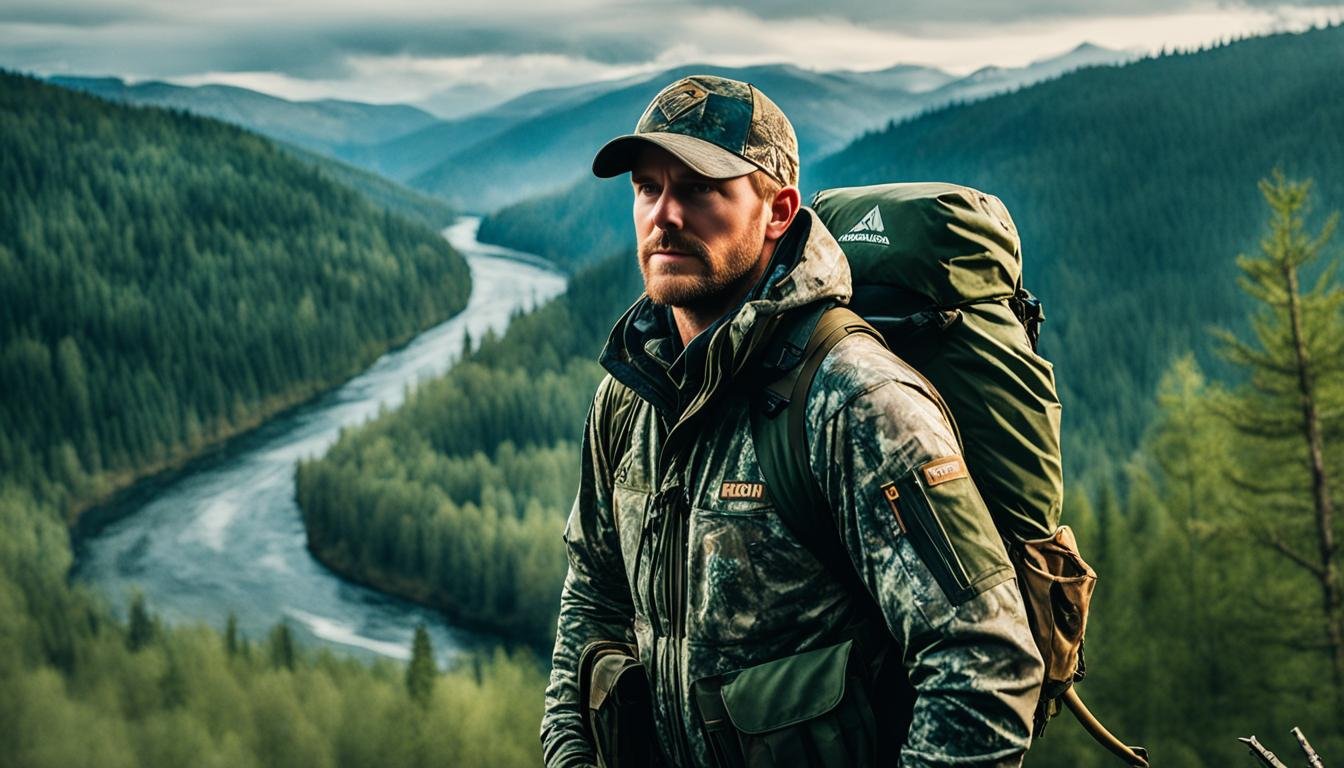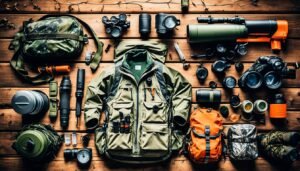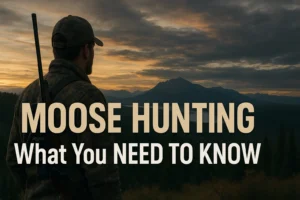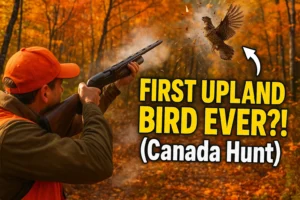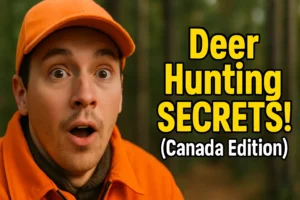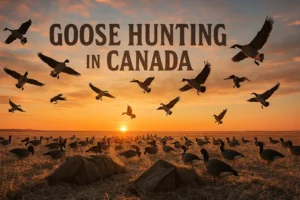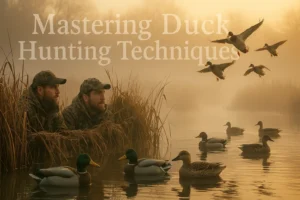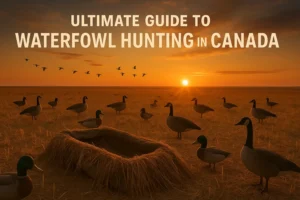Ever thought about going on a hunting trip in one of the world’s most beautiful places? Canada offers vast wilderness, diverse wildlife, and a rich heritage for hunters of all levels.
But, understanding hunting tips, licenses, and Canadian regulations can be tough. This guide aims to make your hunting journey safer and more rewarding. We’ll share key info on hunting licenses and safety tips to get you ready for your adventure.
Key Takeaways about Hunting in Canada
- Hunting in Canada requires understanding provincial regulations and obtaining a valid hunting license.
- Safety should always be a top priority; familiarise yourself with best practices.
- The Canadian landscape is home to diverse wildlife, making hunting an exciting and varied experience.
- Equipping yourself with the right gear is crucial for a successful hunt.
- Planning ahead increases your chances of a rewarding and enjoyable hunt.
- Guided tours can enhance your skills and knowledge about the local hunting terrain.
Understanding Canadian Hunting Regulations
Canada’s diverse landscape and rich wildlife require specific Canadian hunting regulations. Each province and territory has its own rules for hunting methods, seasons, and licenses. For instance, some areas allow bow hunting, while others let you use firearms. Hunters aged 12 to 18 must be supervised unless they have a junior hunting license.
Hunter safety courses are key to Canada’s hunting laws. Many provinces make these courses mandatory. They teach hunters about handling firearms, identifying wildlife, and ethical hunting. It’s important to know about local wildlife and protected species to avoid legal trouble.
Hunters need to know about designated hunting zones. These areas have rules about the game you can hunt and how long you can hunt. The rules change depending on where you are, so it’s important to check with local wildlife agencies. Staying updated helps with responsible hunting and makes the experience better.
Types of Hunting Licences in Canada
Canada has many hunting licences for different hunters. It’s important to know the types of hunting licences for both locals and visitors.
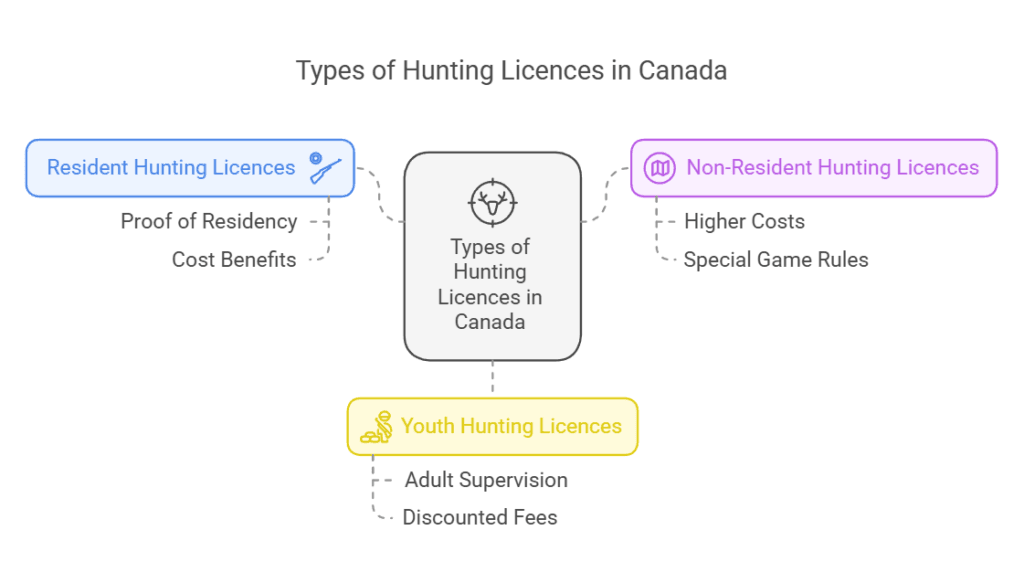
The main types are:
- Resident Hunting Licences: These are for people who live in the province they want to hunt in. You need proof of residency and they’re usually cheaper than non-resident ones.
- Non-Resident Hunting Licences: These are for hunters coming from outside Canada. They cost more and have special rules for the game you’re after.
- Youth Hunting Licences: These are for young hunters and are cheaper. They often need an adult to be with you while you hunt.
The price and rules for each licence change a lot by province. Some places need special licences for big game or small game hunting. Hunters should check the local rules and get the right licence before they go hunting.
Hunting Seasons in Canada
For those who love hunting, knowing the seasons in Canada is key. Each province has its own rules and times for hunting different animals. This means planning your trips carefully is a must. We’ll look at the main dates for hunting and why knowing the seasons matters.
Seasonal Overview
Hunting seasons change with the game and the province you’re in. Most areas have a set time for hunting deer, moose, and turkeys. The season usually starts in late summer or early fall and can go into winter. It’s important to prepare early to follow the rules and have a successful hunt.
- Deer: Primarily hunted in the fall, with peak dates usually between late September and mid-November.
- Moose: The moose hunting season generally occurs in October, although some provinces allow a limited season in September.
- Turkeys: Spring is the main season for turkey hunting, starting in April and lasting through May.
Key Dates for Different Species
Knowing the key dates for hunting in your province is key to planning your trip. Below is a detailed table of hunting seasons for different species.
| Species | Province/Territory | Hunting Season (Start-End) |
|---|---|---|
| Deer | Ontario | October 1 – November 30 |
| Moose | Quebec | September 15 – October 15 |
| Turkeys | British Columbia | April 15 – May 31 |
| Black Bear | Alberta | May 1 – June 15 |
| Pheasants | Saskatchewan | October 15 – November 30 |
Hunting in Canada: Essential Tips for Beginners
Starting your hunting journey can be thrilling yet overwhelming. To make it better, follow some key tips for beginners. It’s important to pick the right gear for a successful and fun hunt.
Choosing the Right Gear
Choosing the right gear is vital for beginners. Look for quality and functionality to stay safe and comfortable. Here are some important things to think about:
- Firearms: Pick firearms you feel good with. Make sure they’re in good shape and right for the game you’re after.
- Clothing: Wear layers for the weather changes. Choose clothes that keep you dry, have insulation, and make you visible with blaze orange.
- Accessories: Carry important items like a hunting knife, binoculars, and a first-aid kit for emergencies.
Affiliate Disclaimer: We may earn a commission from purchases made through the links on this page.
Safety Precautions to Consider
Keeping safe while hunting is crucial. It protects you and others around you. Remember these important safety tips:
- Gun Handling: Always treat guns as if they’re loaded. Keep the muzzle down and your finger off the trigger until you’re ready to fire.
- Hunting Etiquette: Be respectful to other hunters, animals, and nature. A positive hunting culture helps everyone.
- Health and Well-being: Drink water, rest, and know your limits. Learn the area well to avoid risks.
Best Hunting Spots in Canada
Canada is home to a wide variety of hunting spots, each offering unique experiences. From vast forests to expansive prairies, these places give hunters a chance to connect with wildlife. Some provinces are especially great for hunting.
Popular Provinces for Hunting
Some provinces are top picks for hunting because of their rich landscapes and diverse wildlife. Here are a few:
- Alberta: Known for its stunning Rocky Mountains and abundant game, Alberta offers opportunities for elk, deer, and bear hunting.
- British Columbia: With its varied terrain, hunters can pursue species such as moose, black bear, and mountain goat.
- Ontario: The large forests and water bodies are ideal for hunting deer and small game.
Off-the-Beaten-Path Locations
For those seeking adventure, Canada has hidden gems for hunting. These off-the-beaten-path locations offer unique experiences. They let you discover new terrains and wildlife. These spots are great for a personal encounter with nature.
- The remote regions of northern Quebec, which are less frequented by hunters.
- The untouched wilderness of Newfoundland and Labrador, offering unique species like moose.
- Highland areas of the Yukon, where expansive vistas and diverse wildlife await.
Wildlife Conservation in Canada
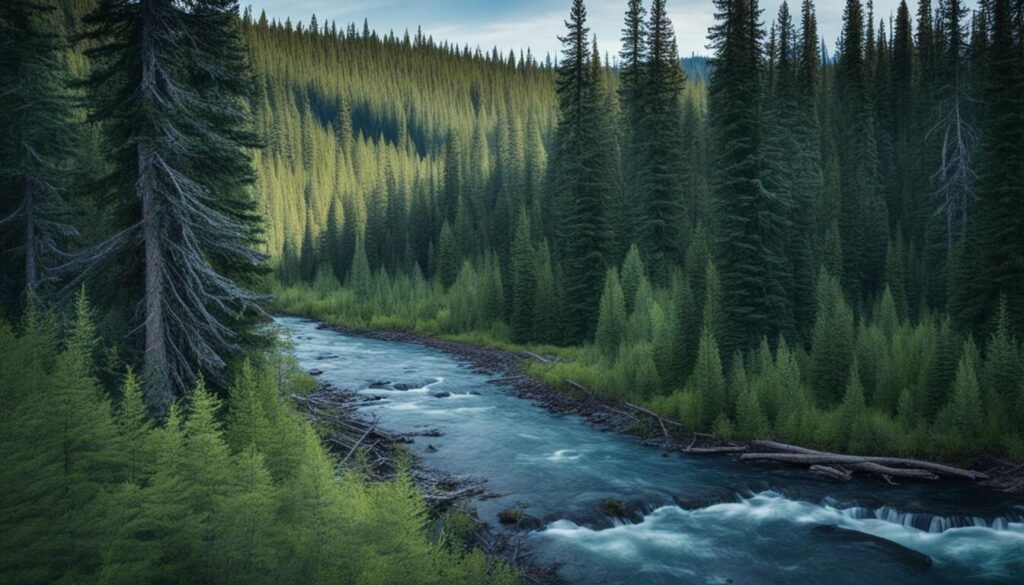
Wildlife conservation in Canada is key to keeping the country’s diverse nature alive. Many programs work to save habitats and protect endangered species. These efforts mix ethical and sustainable practices with activities like hunting and conservation. This approach helps keep ecosystems healthy.
The North American Model of Wildlife Conservation is a major guide for this work. It balances hunting with conservation. It shows the value of science in managing wildlife and asks hunters to help with conservation. This balance helps keep wildlife populations strong and supports hunting, which helps fund conservation.
Working together, hunters and conservation groups make a big difference. Hunters can join local programs to help with things like fixing habitats and saving species. Getting the community involved is important for spreading the word about wildlife and promoting green habits.
In short, keeping Canada’s wildlife safe is crucial for the environment. Learning about hunting and its duties is a step towards a culture that cares for nature. So, teaching people about hunting can really help protect Canada’s unique wildlife.
Guided Hunting Tours in Canada
Going on guided hunting tours in Canada is a great way for both new and seasoned hunters to dive into the wild. These tours offer a structured and knowledgeable way to hunt, making sure everyone has a great time. It’s important to know the benefits of hiring a guide to get the most from your hunt.
Benefits of Hiring a Guide
Hiring a guide brings a lot of expertise to the hunt. They know the land and the animals well, which can help you have a successful hunt. Other benefits include:
- Personalized advice tailored to your skill level.
- Access to exclusive hunting locations.
- Safety in navigating challenging landscapes.
- Assistance with gear selection and preparations.
A guide is a key resource for those new to an area, helping you navigate the complexities of hunting in Canada.
Finding the Right Tour Operator
Choosing the right hunting tour operator is key for a good hunt. Look for operators with strong reviews and a solid history. Here are some tips to help you decide:
- Check credentials, including licenses and certifications.
- Read customer testimonials for firsthand experiences.
- Inquire about the types of hunting services offered and any group packages available.
- Assess the financial aspects, ensuring it aligns with your budget.
With careful research, you can find a reputable operator for an unforgettable hunting trip. For more info on outdoor activities in Canada, check out this guide on fishing.
Preparing for Your Hunting Trip
Getting ready for a hunting trip is crucial for success. It’s all about the details. Make a detailed checklist for gear, food, and other must-haves. Also, plan your trip well to make travel easier.
Checklist of Necessary Items
A hunting trip checklist helps you remember important things. Here’s a list of things you should bring:
- Hunting gear (firearms, ammunition, bows, and arrows)
- Clothing for the weather (layers, waterproofs, etc.)
- Safety gear (first aid kit, whistle, flashlight)
- Food and water (snacks, water bottles, meals)
- Navigation tools (map, compass, GPS device)
- Hunting license and permits
- Emergency contact info
Planning Your Itinerary
Good trip planning is more than just about getting there. It’s about making the most of your hunting days and where you stay. Think about these things:
| Planning Element | Description |
|---|---|
| Timing | Plan your hunting around when animals are most active. |
| Accommodations | Choose lodging near where you’ll be hunting for ease. |
| Local Customs | Learn and respect local rules and hunting ways. |
| Emergency Contacts | Have a list of local authorities and medical help ready. |
Canadian Hunting Laws You Must Know
For all hunters planning trips in Canada, it’s key to know the hunting laws. Following hunting regulations in Canada makes sure your hunt is legal and fun. It also protects wildlife and the environment.
Every province and territory has its own hunting laws. Knowing these rules helps avoid legal trouble. Important parts of these laws include:
- Legal hunting methods, including what gear and techniques are okay.
- Actions that are not allowed, like hunting when it’s closed or using banned guns.
- What counts as poaching, which has big penalties and can take away your hunting rights.
Remember to tell all about your guns when you come into Canada. The Canada Border Services Agency has rules you must follow. These rules changed in 2020, so it’s important to keep up.
Don’t hunt without the right licence, or you could face big fines or legal trouble. Knowing the hunting regulations in Canada helps make your hunt a success. It also helps with conservation.
Looking into both local and national laws before you go will give you the info you need. This way, you’ll follow the rules and have a good time during hunting season.
Tips for Applying for Hunting Licences in Canada
Applying for hunting licences in Canada can seem daunting, but it’s easier if you know the steps. Begin by collecting important documents like ID, proof of where you live, and any past licence info. Having these documents ready makes the application process smoother.
Be careful when filling out your application. Check your personal details for mistakes to avoid delays. Knowing hunting licence application tips helps you not miss any important steps.
Each province has its own rules and fees for different licences. Make sure you know these to avoid problems at the last minute. Remember, fees can change based on the species you’re hunting and if you need extra permits like export permits or migratory bird licences.
It’s important to keep an eye on your application’s progress. This way, you can quickly fix any issues. If you lose documents, know how to get them replaced to keep your hunting rights.
Always stay updated on any changes in the rules that might affect your application or hunting. Check official sources often for new requirements. By following these tips, you’ll be more confident when applying for hunting licences.
| License Type | Fee | Renewal Period |
|---|---|---|
| White-Tailed Deer | $30 | Annual |
| Moose | $50 | Annual |
| Black Bear | $35 | Annual |
| Wild Turkey | $25 | Annual |
| Small Game | $20 | Annual |
Conclusion
As we wrap up our guide on hunting in Canada, it’s clear that knowing the rules and getting the right licenses is key. Being well-prepared and following ethical hunting practices boosts your success and supports the community.
Canada’s hunting culture is rich and invites adventurers to explore its vast lands responsibly. It’s important to follow the laws and support conservation efforts. This way, you’ll have memorable experiences and respect nature.
We encourage you to share your hunting stories or ask questions in the hunting community. Join, learn, and add to the conversation about hunting in Canada. Let’s keep the focus on safety and respect for wildlife and each other.
Frequently Asked Questions: Your Ultimate Guide to Hunting in Canada
So, you want to hunt in Canada? You’re not alone.
Canada’s wilderness is a hunter’s paradise, but it’s not a free-for-all. You need to know the rules, get the right licenses, and be prepared. This FAQ is your no-BS guide to navigating the Canadian hunting landscape, getting your ducks in a row (pun intended), and having a successful and ethical hunt.
What Do I Need to Legally Hunt in Canada?
First things first, you need a hunting license specific to the province or territory where you’ll be hunting. Don’t think you can just waltz in with your rifle and start blasting away. Each province has its own process, and you’ll likely need to pass a hunter safety course first.
It is very important to know the hunting regulations in Canada. You’ll also need to prove your residency status—different licenses apply to residents, non-residents, and non-resident aliens.
How Do I Get a Hunting License in Canada?
You don’t just walk into a store and buy one, pal. You need to apply through the specific province’s or territory’s wildlife management authority. This often involves taking a hunter education course that covers things like firearms safety, wildlife identification, and hunting ethics. Be prepared to show ID, proof of residency (if applicable), and any previous hunting licenses. Many provinces have youth hunting licenses.
What’s the Deal with Hunting Seasons in Canada?
Canada doesn’t mess around with hunting seasons. Each province sets specific dates for different game species, and these dates can vary from year to year. We’re talking deer hunting, moose hunting, waterfowl, upland game birds, you name it.
You need to know the key dates for hunting and plan your trip accordingly. Don’t expect to bag a white-tailed deer in the middle of summer. There are also spring hunting and fall hunting seasons.
Can Non-Residents Hunt in Canada, and What are the Requirements?
You bet, but it’s not as simple as showing up. Non-resident hunters often need to hunt with a licensed guide or outfitter, especially for big game. You’ll need a non-resident hunting license, which typically costs more than a resident license, and you may need additional tags or permits for specific species. Some provinces require a firearm declaration form for non-residents.
What are the Best Hunting Spots in Canada?
Canada’s a big country, and the “best” spot depends on what you’re hunting. Alberta is famous for its elk and mule deer. British Columbia offers incredible mountain goat and black bear hunting. Ontario has great white-tailed deer and small game hunting. And don’t forget about the remote territories for a true wilderness experience.
Saskatchewan is known for its pheasant hunting. Quebec is known for moose hunting. Newfoundland and Labrador are known for moose hunting. The Yukon offers great hunting opportunities. The best hunting locations are found throughout Canada.
What Gear Do I Need for a Hunting Trip in Canada?
You’re not going on a picnic. You need the right firearm or bow for your chosen game, appropriate ammunition or arrows, camo clothing, waterproof boots, a good hunting knife, binoculars, a rangefinder, and a first-aid kit.
Don’t forget navigation tools like a map, compass, and GPS device. Depending on the season and location, you might need insulated clothing, rain gear, and even snowshoes. Use high-performance hunting apparel. Use premium camo gear. Consider Sportsman’s Guide for your purchases.
What Safety Precautions Should I Take When Hunting in Canada?
Safety isn’t optional; it’s mandatory. Always treat every firearm as if it’s loaded. Never point your muzzle at anything you don’t intend to shoot. Be sure of your target and what’s beyond it. Wear hunter orange or blaze orange to be visible to other hunters. Let someone know your hunting plans, including your location and expected return time. Carry a survival kit and know how to use it. Learn to identify endangered species.
How Can Guided Hunting Tours Help Me?
Look, unless you’re a seasoned pro with local knowledge, a guided hunting tour can be a game-changer. Guides know the terrain, the animal behavior, and the best hunting spots. They can help you with logistics, gear selection, and even field dressing your game. Plus, they can significantly increase your chances of a successful hunt. They help you with wildlife conservation.
How Do I Apply for a Hunting License if I’m a Non-Resident Alien?
Non-resident aliens have a few more hoops to jump through. You’ll need all the usual stuff—hunter safety course, previous licenses, etc.—but you’ll also need to provide proof of your identity and your alien status. You might need to apply for a firearm license or permit to bring your gun into Canada.
What’s This I Hear About a Hunting Trip Checklist?
A hunting trip checklist is your best friend. It ensures you don’t forget anything crucial. We’re talking hunting gear, clothing, licenses, permits, first-aid supplies, food, water, navigation tools, and anything else you might need. Write it down, check it twice, and don’t be the guy who forgets his ammo.
How do I Transport Firearms into Canada?
Bringing firearms into Canada is serious business. You need to declare your firearms to the Canada Border Services Agency and have the proper paperwork, including a Non-Resident Firearm Declaration. There are restrictions on certain types of firearms, so make sure yours is legal in Canada. You might need a Canadian firearms license.
What are the Penalties for Violating Hunting Regulations in Canada?
Don’t even think about it. Penalties for breaking hunting regulations can range from hefty fines to seizure of your gear and even jail time. You could lose your hunting privileges permanently. Play by the rules, or don’t play at all.
How can I learn more about hunting ethics and wildlife conservation?
Take a hunter education course. They don’t just cover safety; they also teach you about ethical hunting practices and the importance of wildlife conservation. You can also join hunting organizations and learn from experienced hunters. Remember, hunters play a crucial role in conservation efforts. They help fund habitat preservation.
What are some important considerations when planning my hunt?
Consider the timing of your hunt to ensure you are hunting when the animals are most active. You should also consider accommodations and choose a place close to your hunting grounds.
Hunting Gear Guide: Build a Modular System That Actually Works
Build a smarter hunting kit. This Hunting Gear Guide shows you how to build a modular gear system fo…
Read MoreTurkey Hunting: Your Guide to Canadian Seasons
Learn about turkey hunting in Canada: seasons, rules, gear, and safety tips. Get ready for your next…
Read MoreElk Hunting in Canada: What to Know
Discover essential tips for elk hunting in Canada. Learn about licenses, seasons, and how to plan yo…
Read MoreMoose Hunting in Canada: What to Know
Learn about moose hunting in Canada. Understand rules, seasons, and what you need for a safe, legal …
Read MoreUpland Bird Hunting: Rules & Tips
Learn about Upland Bird Hunting in Canada. Find simple info on rules, birds, and how to get started …
Read MoreDeer Hunting in Canada: Simple Guide
Learn about deer hunting in Canada. Find simple tips on rules, safety, and why it matters. Your easy…
Read MoreGoose Hunting in Canada: Rules & Tips
Plan your hunt with confidence. Your expert guide to Goose Hunting in Canada covers updated 2025 reg…
Read MoreMastering Duck Hunting Techniques in Canada
Elevate your hunt with expert Duck Hunting Techniques for Canada. Learn scouting, calling, decoys, g…
Read More7 Essential Steps for a Successful Waterfowl Hunting Trip in Canada
Master waterfowl hunting in Canada with our 7 essential steps. Learn about federal & provincial regu…
Read More